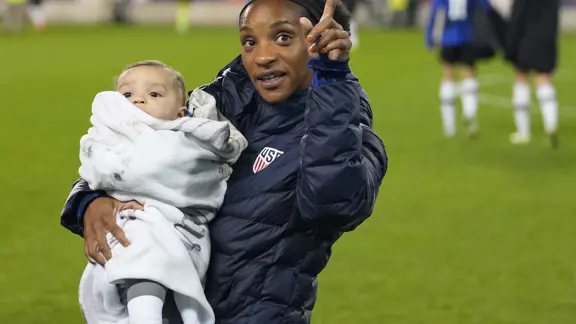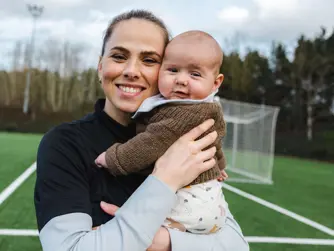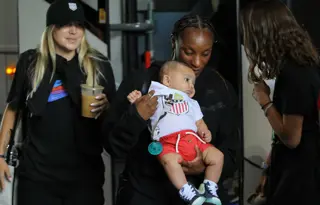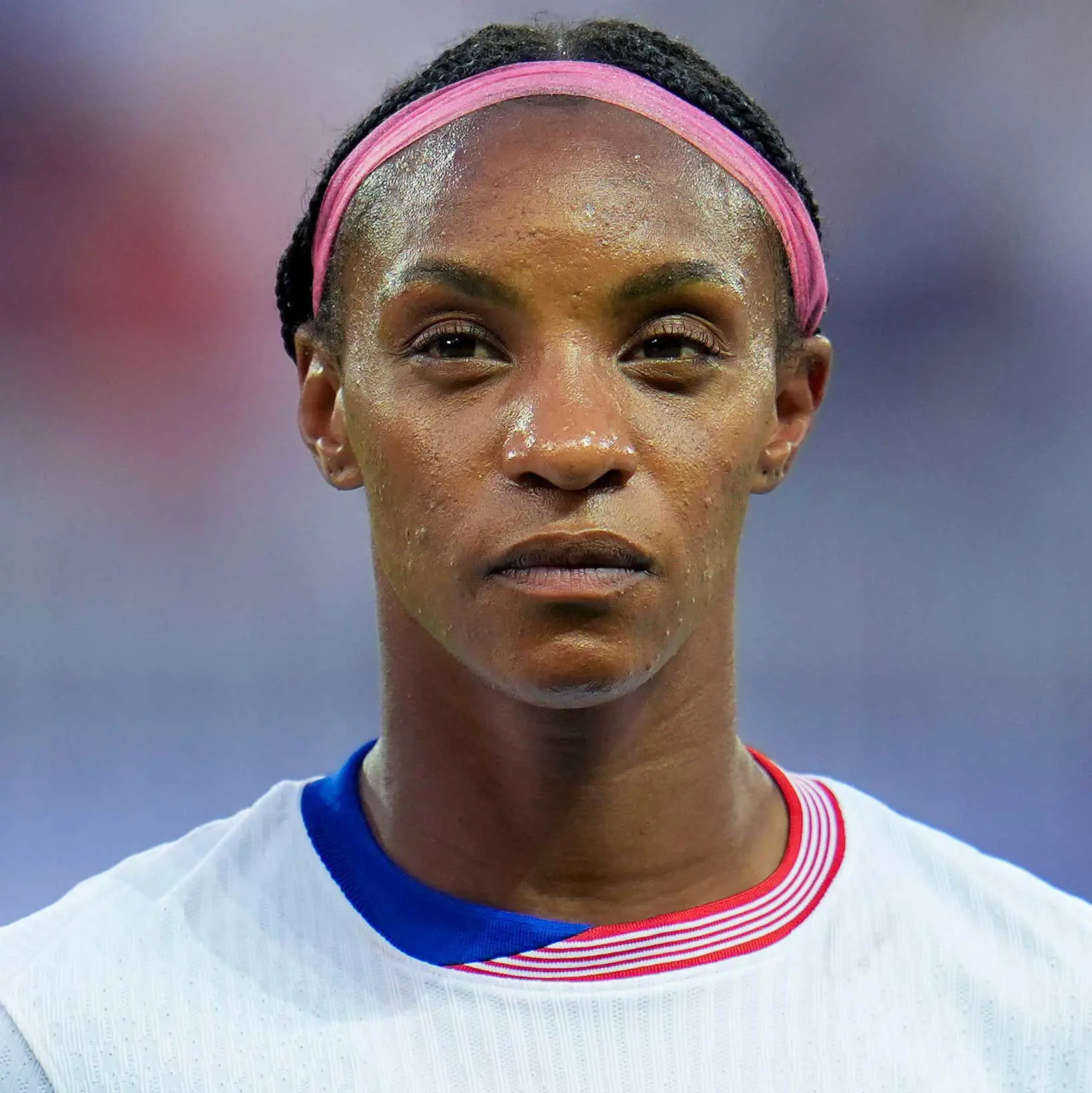Player Story
Crystal Dunn: "We must raise the game for mothers in soccer"

Crystal Dunn
2019 Women’s World Cup champion Crystal Dunn is a defender for NWSL side Portland Thorns. A member of FIFPRO’s Global Player Council, Dunn became a mother for the first time in 2022 and is a strong advocate for maternal rights.

You know that phrase: ‘It takes a village to raise a child’? It took being pregnant and having a baby for me to realise just how true it is. It’s not something that you can do on your own, and nor should anyone ever have to.
Stepping into the journey of becoming a mom for the first time is a scary experience no matter what your situation. But having the reassurance of loving friends and a supportive work environment makes all the difference – because you know you’re not going into it alone. When I travel with my team, I think how lucky I am. There’s always someone asking me if they can carry my backpack or look after the baby for me. It’s like having a team of 25 aunties who are standing in line waiting to cuddle, adore, and protect my son.
I came back to training 112 days after Marcel was born and scored my first goal as a mom with him in the crowd. For me that moment was so much bigger than just scoring a goal; it was a landmark moment in my motherhood journey.
Even when you make it back to the field, you’re always going to have to battle the self-doubt. You think, Will I ever be that player again?
But the moment that goal went in I just thought, I’m back, I can do this.
✨2023 ✨
— Crystal Dunn | Soubrier | (@Cdunn19) March 26, 2023
1)𝙼𝚢 𝚏𝚊𝚖𝚒𝚕𝚢
2)𝙼𝚢 𝚋𝚘𝚞𝚗𝚍𝚊𝚛𝚒𝚎𝚜
3)𝙼𝚢 𝚛𝚎𝚕𝚎𝚗𝚝𝚕𝚎𝚜𝚜 𝚙𝚞𝚛𝚜𝚞𝚒𝚝 𝚝𝚘
▀▄▀▄▀▄WIN EVERYTHING▄▀▄▀▄▀ pic.twitter.com/PxjvgEq9nN
A lot of people were surprised that I had come back after a relatively short period, but it was right for me. If I had needed more time, I would have taken it. But I was ready to take that next step as a mother and as a player. I listened to my friends who became mothers before, to the professionals who guided me through each step of my pregnancy, and most importantly to my body, and I really honed in on what was right for me.
Motherhood is a different journey for everyone that takes it, and it’s really important that we aren’t treated as just ‘players’ or ‘mothers’ but as individuals with our own needs and limitations. For me, being pregnant was the easy part. It was very clear that I couldn’t play, and there were very precise guidelines about my training progression as a pregnant athlete. Once the baby gets here though, that’s when it’s up to you. When should I exercise? When can I run? Women need the freedom to work this out on their own depending on what their body is telling them.
I’m so grateful that my club and US Soccer have been totally supportive of me, both during the pregnancy and postpartum, and my team-mates were over the moon to find out I was pregnant. As an athlete I was a bit nervous about revealing that I was expecting, but realistically I wasn’t the first Portland Thorns player to have a child, and I knew from experience that there was a structure in place for me and that I would be supported. Knowing that I was going to be looked after emotionally, physically, and financially really took a weight off my mind and allowed me to focus on what was best for me and my baby.
Unfortunately, this makes me one of the lucky ones, and my experience isn’t mirrored for all expectant mothers in football. I was outraged to hear what Sara Bjork experienced with Olympique Lyonnais, a club famed for championing women’s football, who tried to leave her without pay for the duration of her pregnancy. It was an opportunity for them to show their commitment and go above and beyond in their efforts to protect their players, and instead they tried to shirk the bare minimum that was laid out by the FIFA Maternity Regulations.
Sara Bjork Gunnarsdottir’s maternity case shows all players need protection – even those at high-profile clubs

I’m glad that she had the support of her friends and family, but as an athlete she deserves financial stability – and her employers should never have given her any cause to doubt that. We don’t stop being professional players when we fall pregnant, but that’s the message that this kind of behaviour sends out to the world. It’s so harmful and we need to do everything in our power to fight it. Nobody – women’s player or otherwise – should have to choose between her career and motherhood.
Thankfully she had her players’ union and FIFPRO to fall back on, to help her fight for what was rightfully hers. I can well imagine at that stage in her life that she might not have had the energy to take this on by herself, with so many other things to focus on. Having a support network in place is so important for protecting players in potentially vulnerable situations.
The thing is, it’s not just the pregnancy that needs supporting, and there’s a lot to adapt to as you begin to balance your life as a mother and a player. Some days it’s easy, but others have made me take a step back and think, There’s a reason that this is the path less travelled. Being a mom is incredible, and everyone told me that it would be life-changing, but I wasn’t prepared for how true that would be.
I used to stress so much about every little detail of my work: a bad game, an off-pass, a missed chance. Being a mother has given me more perspective, in that nothing is ever going to be as important as the health, safety and happiness of my child. I’ve learned to channel negative feelings about my job in a healthier way and I think that it has not only made me a better person, but a better player as well.
On the other hand, when I was done with training, it used to be me-time. Now, it’s straight to the nanny to pick up the baby and, although I wouldn’t trade places for anything, it does take some getting used to. Those afternoon naps? A thing of the past. Casually popping out for a coffee? Laughable.
It's a new space to navigate, and that’s why it’s so important that a mother’s care doesn’t stop when the baby arrives. For example, when I travel with the team, Crystal Dunn is no longer just one person to consider but three: me, Marcel, and the nanny. Those extra costs, such as travel and accommodation, shouldn’t fall on the player – they are necessary for her to do her job effectively. Her baby is now an extension of her, and therefore so is a nanny. Again, Portland Thorns and US Soccer understood my needs, and made sure that my expectations were met in this regard, but for some people this necessity is still seen as a luxury – and I want to help change that.

Soccer is my life, but I’ve always known that I have more to give to the game than my role as a player. I have a platform, and with that comes not only an opportunity, but an obligation to advance the sport for others. Embarking on motherhood while pursuing my career is my own individual journey, but it’s also a chance for me to advocate for others that find themselves in the same situation.
I don’t want the narrative to be that I was lucky because I had such a great experience – I want it to be the standard for players across the world. My role in the Global Player Council allows me to campaign for this change, and to help ensure that this level of care is a right rather than a privilege.
We are working to ensure that financial stability remains intact for everybody, and hopefully Sara’s ordeal will help to lead the way for any other players who are struggling with their employers in this regard. Another non-negotiable is access to appropriate healthcare. As athletes our bodies are our livelihoods, and we need to be fully aware of how to take care of them during the changes of pregnancy. These issues are just the tip of the iceberg, and there’s so much more that I hope we can achieve.
Like I said, it takes a village to raise a child. There’s power in numbers. It is not only my obligation but my passion to pull players together, to harness that power and raise the game for mothers in soccer.
